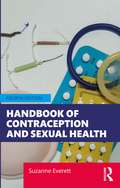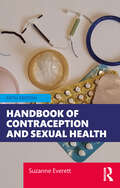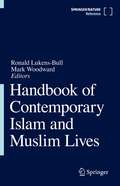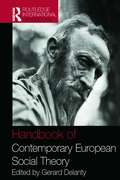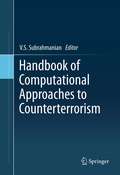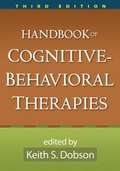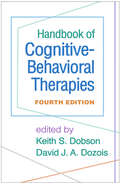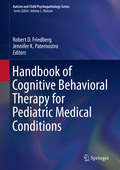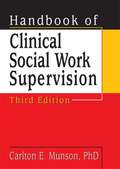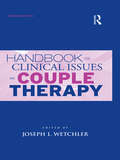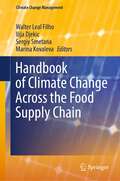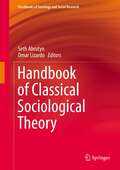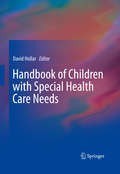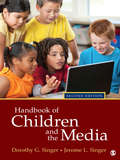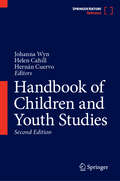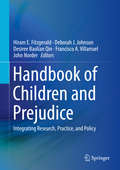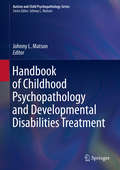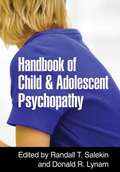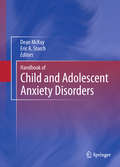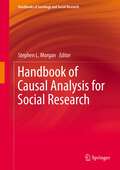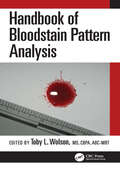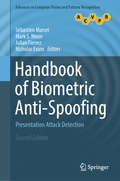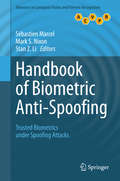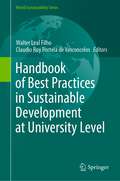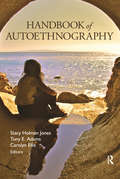- Table View
- List View
Handbook of Contraception and Sexual Health
by Suzanne EverettOffering a comprehensive guide to contraception and sexual health, the new edition of this practical handbook has been fully updated with the latest clinical guidance, research and methods, including new technologies. Giving clear and detailed information about all contraceptive methods, including how to use them, contra-indications, interactions and common patient anxieties, this guide takes an integrated approach to sexual health. It includes updated chapters on the consultation, person-centred care, anatomy and physiology, and sexually transmitted infections. The new edition adds content on pharmacology for independent prescribers, pornography, trafficking, female genital mutilation (FGM) and other issues related to safeguarding, LGBT sexuality, and new technologies such as apps, online screening kits and SH24. With plenty of self-assessment exercises, question and answers, and case scenarios, the Handbook of Contraception and Sexual Health is an essential read for all nurses, midwives and allied health professionals working in community health and primary care settings.
Handbook of Contraception and Sexual Health
by Suzanne EverettOffering a comprehensive guide to contraception and sexual health, the new edition of this practical handbook has been fully updated with the latest clinical guidance, research and methods, including new technologies.Giving clear and detailed information about all contraceptive methods, including how to use them, contra-indications, interactions and common patient anxieties, this guide takes an integrated approach to sexual health. It includes updated chapters on the consultation, person-centred care, anatomy and physiology and sexually transmitted infections. The new edition has been updated and reformatted to increase accessibility.With plenty of self-assessment exercises, questions and answers and case scenarios, the Handbook of Contraception and Sexual Health is an essential read for all nurses, midwives and allied health professionals working in community health and primary care settings.
Handbook of Contemporary Islam and Muslim Lives
by Mark Woodward Ronald Lukens-BullThis is a comprehensive handbook which for the first time provides a general yet detailed discussion of contemporary Islam and various aspects of Muslim lives. It offers a much needed tool for an introduction to the world of contemporary Muslim life and debate, and a link of continuity between the Muslim world and Muslims living and born in the West. The reader gains access to articles by leading scholars who observe phenomena in a post-9/11 context and from a global viewpoint. The topics have been carefully selected to provide the reader with both the necessary general view that a good handbook must offer while presenting details and information, as well as ethnographic examples, to inspire further research and interest. Indeed, each chapter will offer topical reading suggestions from which one can expand the material discussed in the chapter. The approach of the handbook is mainly social-anthropological, but attention is given to other disciplines like history, geography, political studies, as well as gender studies and cultural studies.
Handbook of Contemporary European Social Theory
by Gerard DelantyThis innovative publication maps out the broad and interdisciplinary field of contemporary European social theory. It covers sociological theory, the wider theoretical traditions in the social sciences including cultural and political theory, anthropological theory, social philosophy and social thought in the broadest sense of the term. This volume surveys the classical heritage, the major national traditions and the fate of social theory in a post-national and post-disciplinary era. It also identifies what is distinctive about European social theory in terms of themes and traditions. It is divided into five parts: disciplinary traditions, national traditions, major schools, key themes and the reception of European social theory in American and Asia. Thirty-five contributors from nineteen countries across Europe, Russia, the Americas and Asian Pacific have been commissioned to utilize the most up-to-date research available to provide a critical, international analysis of their area of expertise. Overall, this is an indispensable book for students, teachers and researchers in sociology, cultural studies, politics, philosophy and human geography and will set the tone for future research in the social sciences.
Handbook of Computational Approaches to Counterterrorism
by V. S. SubrahmanianTerrorist groups throughout the world have been studied primarily through the use of social science methods. However, major advances in IT during the past decade have led to significant new ways of studying terrorist groups, making forecasts, learning models of their behaviour, and shaping policies about their behaviour. Handbook of Computational Approaches to Counterterrorism provides the first in-depth look at how advanced mathematics and modern computing technology is shaping the study of terrorist groups. This book includes contributions from world experts in the field, and presents extensive information on terrorism data sets, new ways of building such data sets in real-time using text analytics, introduces the mathematics and computational approaches to understand terror group behaviour, analyzes terror networks, forecasts terror group behaviour, and shapes policies against terrorist groups. Auxiliary information will be posted on the book's website. This book targets defence analysts, counter terror analysts, computer scientists, mathematicians, political scientists, psychologists, and researchers from the wide variety of fields engaged in counter-terrorism research. Advanced-level students in computer science, mathematics and social sciences will also find this book useful.
Handbook of Cognitive-Behavioral Therapies, Third Edition
by Keith DobsonThis acclaimed text and practitioner reference presents an authoritative overview of major models of cognitive-behavioral therapy (CBT). Foremost treatment developers explain core CBT principles and provide a framework for systematic assessment, case conceptualization, and treatment planning. Scholarly yet accessible chapters on each therapy detail what makes the approach unique, which clinical problems it is used to treat, what assessment and intervention tools have been developed, how they are implemented, and what the research reveals about the therapy's effectiveness. Special topics include working with children and adolescents, couples, and culturally diverse clients. The Handbook has been widely adopted in training programs, and the revisions in this edition reinforce its value as a text. New to This Edition The latest findings and clinical advances. Additional therapies schema therapy and mindfulness- and acceptance-based interventions. Chapter on the empirical evidence base for CBT.Chapters on treatment of couples and culturally diverse clients.
Handbook of Cognitive-Behavioral Therapies, Fourth Edition
by Keith S. Dobson David J. DozoisNow revised and expanded with over 50% new material, this definitive clinical reference is the text of choice for graduate-level courses in evidence-based psychotherapy. Foremost authorities describe the conceptual and scientific foundations of cognitive-behavioral therapy (CBT) and provide a framework for assessment and case formulation. Major approaches are reviewed in detail, including emotion-centered problem-solving therapy, rational emotive behavior therapy, cognitive therapy, schema therapy, mindfulness- and acceptance-based interventions, and dialectical behavior therapy (DBT). Applications to specific populations are discussed, including children and adolescents, couples, culturally diverse clients, and more. New to This Edition *Chapter on clinical assessment. *Chapter on DBT. *Chapters on transdiagnostic treatments, CBT-based prevention models, and improving dissemination and implementation. *Existing chapters extensively revised or rewritten to reflect important research and clinical advances.
Handbook of Cognitive Behavioral Therapy for Pediatric Medical Conditions (Autism and Child Psychopathology Series)
by Robert D. Friedberg Jennifer K. PaternostroThis handbook offers a comprehensive review of cognitive behavioral therapy (CBT) for working in integrated pediatric behavioral health care settings. It provides research findings, explanations of theoretical concepts and principles, and descriptions of therapeutic procedures as well as case studies from across broad conceptual areas. Chapters discuss the value of integrated care, diversity issues, ethical considerations, and the necessary adaptations. In addition, chapters address specific types of pediatric conditions and patients, such as the implementation of CBT with patients with gastrointestinal complaints, enuresis, encopresis, cancer, headaches, epilepsy, sleep problems, diabetes, and asthma. The handbook concludes with important directions in research and practice, including training and financial considerations.Topics featured in this handbook include: Emotional regulation and pediatric behavioral health problems. Dialectical Behavior Therapy (DBT) for pediatric medical conditions. Pharmacological interventions and the combined use of CBT and medication. CBT in pediatric patients with chronic pain. CBT for pediatric obesity. CBT-informed treatments and approaches for transgender and gender expansive youth.Medical non-compliance and non-adherence associated with CBT.Training issues in pediatric psychology. The Handbook of Cognitive Behavioral Therapy for Pediatric Medical Conditions is an essential resource for researchers and graduate students as well as clinicians, related therapists, and professionals in clinical child and school psychology, pediatrics, social work, developmental psychology, behavioral therapy/rehabilitation, child and adolescent psychiatry, nursing, and special education.
Handbook of Clinical Social Work Supervision
by Carlton MunsonTake social work supervision into the new millennium!This newly revised edition of the classic text is a thorough, comprehensive guidebook to every aspect of supervision, including learning styles, teaching techniques, emotional support for supervisors, and supervision in different settings. Its detailed discussions of ethics and legal issues in practice are invaluable. Designed for use by busy supervisors, Handbook of Clinical Social Work Supervision, Third Edition, offers a new partnership model of supervision.Thoroughly revised and updated, Handbook of Clinical Social Work Supervision, Third Edition, addresses the dramatic changes in the field brought by new technologies and managed care. Numerous case illustrations and exercises supplement the text to facilitate classroom discussion or continuing education seminars. Assessment scales have been modified to conform to more recent data, and the questionnaires have been extensively revised. In addition, you will find significant new material on crucial topics, including: using DSM-IV categories for diagnosis and assessment how managed care has changed treatment planning, practice protocols, documentation, and other aspects of social work issues of cultural diversity, including respect for persons with disabilities and handling gender issues dealing with specific problems and populations, including domestic violence, substance and alcohol abuse, and child and adolescent treatment a model for managing organizational change social worker stress and burnout new directions for social work as a professionHandbook of Clinical Social Work Supervision, Third Edition, will help you change your practice with the times by incorporating the capabilities of the Internet and other advanced technologies. It will also teach you to work around the restrictions created by managed care insurance plans. This bestselling textbook is ideal for classroom use as well as being an essential resource for any supervisor.
Handbook of Clinical Issues in Couple Therapy
by Joseph L. WetchlerNow updated in its second edition, Handbook of Clinical Issues in Couple Therapy provides a comprehensive overview of emerging issues that impact couple therapy. Unlike other guides that concentrate more on theoretical approaches, this invaluable resource contains the latest research and perspectives that every clinician needs when dealing with the challenging issues often found in practice. Carefully referenced, it explores a range of issues that include intimate partner violence, posttraumatic stress disorder and its effect on couple relationships, divorce therapy, remarriage and cohabitation issues, cultural issues, and couple therapist training. This insightful edited volume is suitable for a wide spectrum of readers, including couple and family therapists, counselors, psychologists, social workers, pastoral counselors, educators, and graduate students.
Handbook of Climate Change Across the Food Supply Chain (Climate Change Management)
by Walter Leal Filho Marina Kovaleva Ilija Djekic Sergiy SmetanaThis book presents climate change as a global phenomenon which affects the entire food chain. Many studies analyzing environmental impacts of food systems confirm significant effects of food production on climate change. Most of them associate primary production with emission of greenhouse gasses identified as one of the causes resulting in warming the atmosphere and global climate effects. A wider perspective shows that the food chains start at farms with consumers being at the end of the pipeline. This approach emphasizes the role of the entire food chain highlighting different kinds of environmental impacts affecting climate change. On the other side, temperature changes and variations of precipitation patterns, together with extreme weather events and water reduction, are recognized as predictors for producing less food, decreased food quality, new food safety risks, biodiversity losses, and depletion of resources associated with food production in modified circumstances. Last but not least, these effects introduce new threats known as food security where some assumptions stress that almost one billion of people are hungry not receiving enough food as a result of climate changes. As a result, the UN highlights the need for combating climate change and promotes sustainable (food) consumption and production. Based on the perceived need to promote and disseminate information on climate change related to food system, the “Handbook of Climate change across the food supply chain” is being produced. The publication compiles information, experiences, practical initiatives, and projects around the subject matter and makes it available to a wide audience. It is expected that the “Handbook of Climate change across the food supply chain” makes many benefits of climate service clearer and, inter alia, leads to an increase in the demand for such important services.
Handbook of Classical Sociological Theory (Handbooks of Sociology and Social Research)
by Seth Abrutyn Omar LizardoThis is the first handbook focussing on classical social theory. It offers extensive discussions of debates, arguments, and discussions in classical theory and how they have informed contemporary sociological theory. The book pushes against the conventional classical theory pedagogy, which often focused on single theorists and their contributions, and looks at isolating themes capturing the essence of the interest of classical theorists that seem to have relevance to modern research questions and theoretical traditions. This book presents new approaches to thinking about theory in relationship to sociological methods.
Handbook of Children with Special Health Care Needs
by David HollarChildren with chronic conditions, developmental disorders, and birth defects represent a sizeable minority of American children--as many as one in five. Often their families have financial or other issues limiting their access to appropriate care, thus limiting their adult prospects as well. Compounding the problem, many valuable resources concerning this population are difficult to access although they may be critical to the researchers, practitioners, and policymakers creating standards for quality care and services. In response, the Handbook of Children with Special Health Care Needs assembles research, applied, and policy perspectives reflecting the range of children's problems requiring special services. Widely studied conditions (e.g., communication disorders, substance abuse) and those receiving lesser attention (e.g., tuberculosis) are covered, as are emerging ideas such as the "medical home" concept of continuity of care. Its interdisciplinary outlook makes the Handbook of Children with Special Health Care Needs a vital, forward-looking text for developmental psychologists, pediatricians, early childhood and special education researchers and practitioners, disability researchers, policymakers, and advocates, and providers for children with special health care needs.
Handbook of Children and the Media
by Dorothy G. Singer Dr Jerome L. SingerCyber-bullying, sexting, and the effects that violent video games have on children are widely discussed and debated. With a renowned international group of researchers and scholars, the Second Edition of the Handbook of Children and the Media covers these topics, is updated with cutting-edge research, and includes comprehensive analysis of the field for students and scholars. This revision examines the social and cognitive effects of new media, such as Facebook, Twitter, YouTube, Skype, iPads, and cell phones, and how children are using this new technology. This book summarizes the latest research on children and the media and suggests directions for future research. This book also attempts to provide students with a deliberate examination of how children use, enjoy, learn from, and are advantaged or disadvantaged by regular exposure to television, new technologies, and other electronic media.
Handbook of Children and Youth Studies
by Johanna Wyn Helen Cahill Hernán CuervoThis second edition of the handbook gives a new scientific perspective to youth and childhood studies as multi scientific and interdisciplinary subjects which as such have not yet found their own framing in a particular discipline. It provides theoretical and methodological key debates and issues that develop and add an understanding of childhood and youth research discipline from a broader perspective. The Handbook on Children and Youth Studies draws on current thinking, but also challenges theoretical and conceptual orthodoxies in the field, drawing on interdisciplinary thinking and critical perspectives. It focuses on childhood and youth to address the emerging consensus that the boundaries between childhood, youth and adulthood are blurred. The view that defining youth and childhood largely in terms of problem topics is out dated. Instead, the handbook focuses on 16 themes that are open to international perspectives and to different conceptual approaches. Each theme is edited by a pair of field editors, thereby capturing a plurality of views. The 16 themes as a starting point are globally timely and they need scientific debates on the boundaries between childhoods, youth and adulthood. This handbook will meet the needs of childhood and youth researchers and the academics in the field. It recognizes the changing social context of the lives of children and young people, while developing theoretical frameworks and discussing about the core substantive issues of Children and Youth Studies.
Handbook of Children and Prejudice: Integrating Research, Practice, and Policy
by Deborah J. Johnson Hiram E. Fitzgerald Desiree Baolian Qin Francisco A. Villarruel John NorderThis handbook examines the effects and influences on child and youth development of prejudice, discrimination, and inequity as well as other critical contexts, including implicit bias, explicit racism, post immigration processes, social policies, parenting and media influences. It traces the impact of bias and discrimination on children, from infancy through emerging adulthood with implications for later years. The handbook explores ways in which the expanding social, economic, and racial inequities in society are linked to increases in negative outcomes for children through exposure to adverse childhood experiences (ACEs). Chapters examine a range of ACEs – low income, separation/divorce, family substance abuse and mental illness, exposure to neighborhood and/or domestic violence, parental incarceration, immigration and displacement, and parent loss through death. Chapters also discuss discrimination and prejudice within the adverse experiences of African American, Asian American, European American, Latino, Native American, Arab American, and Sikh as well as LGBTQ youth and non-binary children. Additionally, the handbook elevates dynamic aspects of resilience, adjustment, and the daily triumphs of children and youth faced with issues related to prejudice and differential treatment.Topics featured in the Handbook include:The intergenerational transmission of protective parent responses to historical trauma.The emotional impact of the acting-white accusation.DREAMers and their experience growing up undocumented in the USA.Online racial discrimination and its relation to mental health and academic outcomes.Teaching strategies for preventing bigoted behavior in class.Emerging areas such as sociopolitical issues, gender prejudice, and dating violence. The Handbook of Children and Prejudice is a must-have resource for researchers, graduate students, clinicians, therapists, and other professionals in clinical child and school psychology, social work, public health, developmental psychology, pediatrics, family studies, juvenile justice, child and adolescent psychiatry, and educational psychology.
Handbook of Childhood Psychopathology and Developmental Disabilities Treatment (Autism and Child Psychopathology Series)
by Johnny L. MatsonThis handbook explores the rapid growth in childhood developmental disabilities (DD) treatments. It reviews current evidence-based treatments for common psychopathologies and developmental disorders and evaluates the strengths of the treatments based on empirical evidence. Spanning infancy through the transition to young adulthood, chapters provide definitions, etiologies, prevalence, typical presentation and variants, assessment and diagnostic information, and age considerations. Chapters also review established and emerging psychological approaches and pharmacotherapies for cognitive, behavioral, emotional, medical, academic, and developmental issues as diverse as mood disorders, the autism spectrum, memory problems, feeding disorders, Tourette syndrome, and migraines. The wide range of topics covered aids practitioners in working with the complexities of young clients’ cases while encouraging further advances in an increasingly relevant field. Topics featured in this handbook include:An introduction to Applied Behavior Analysis.Parent training interventions.Treatment strategies for depression in youth.Assessment and treatment of self-injurious behaviors in children with DD. Treatment approaches to aggression and tantrums in children with DD.Interventions for children with eating and feeding disorders. The Handbook of Childhood Psychopathology and Developmental Disabilities Treatment is a must-have resource for researchers, graduate students, clinicians, and related therapists and professionals in clinical child and school psychology, pediatrics, social work, developmental psychology, behavioral therapy/rehabilitation, child and adolescent psychiatry, and special education.
Handbook of Child and Adolescent Psychopathy
by Randall Salekin Donald LynamThis comprehensive handbook synthesizes the rapidly growing research base on child and adolescent psychopathy: its nature, causes, development, assessment, and treatment. The editors and contributors are leading authorities who review state-of-the-art empirical findings and weigh in on pressing questions, such as how the disorder should be conceptualized in youth and how to evaluate it in clinical and forensic contexts. Available assessment instruments and intervention approaches are critically examined. Etiological theories are presented that shed light on a range of potential causal mechanisms, including genetics, brain functioning, temperament, family processes, and other factors.
Handbook of Child and Adolescent Anxiety Disorders
by Dean Mckay Eric A. StorchIs it school refusal or separation anxiety disorder? Can preschoolers have panic attacks? Does food neophobia really exist? For readers seeking ways to improve assessment, case conceptualization, or treatment plans as well as a more general understanding of anxiety disorders among children, the Handbook of Child and Adolescent Anxiety Disorders addresses these and many other complex issues. A straightforward companion to the diagnostic manuals, this volume crosses theoretical boundaries to describe in depth the wide range of children's anxiety disorders and to explain the developmental nuances that separate them from their adult analogues. Coverage includes: Diagnostic and etiological models of children's anxiety disorders (i.e., genetic, cognitive-behavioral, taxonomic, neuropsychological, dimensional). Differential diagnosis guidelines for generalized anxiety disorder (GAD), phobic conditions, obsessive-compulsive disorder (OCD), and posttraumatic stress disorder (PTSD) in youth. Ancillary factors in child and adolescent anxiety (e.g., personality, temperament, parenting issues, and comorbid conditions). Psychological, pharmacological, and combined treatments for childhood anxiety disorders. Special populations and emerging areas of interest, including anxiety disorders in the contexts of chronic health problems and developmental disabilities. The Handbook of Child and Adolescent Anxiety Disorders is a must-have reference for researchers, clinicians, and graduate students in psychology, psychiatry, social work and counseling as well as allied professionals in hospitals, community mental health centers, schools, and private practice.
Handbook of Causal Analysis for Social Research
by Stephen L. MorganWhat constitutes a causal explanation, and must an explanation be causal? What warrants a causal inference, as opposed to a descriptive regularity? What techniques are available to detect when causal effects are present, and when can these techniques be used to identify the relative importance of these effects? What complications do the interactions of individuals create for these techniques? When can mixed methods of analysis be used to deepen causal accounts? Must causal claims include generative mechanisms, and how effective are empirical methods designed to discover them? The Handbook of Causal Anlaysis for Social Research tackles these questions with nineteen chapters from leading scholars in sociology, statistics, public health, computer science, and human development.
Handbook of Bloodstain Pattern Analysis
by Toby L. WolsonThe Handbook of Bloodstain Pattern Analysis captures the latest understanding of the science that supports bloodstain pattern analysis (BPA) and includes the results of numerous research studies using modern technologies not found in previously published books. It provides the BPA community with a modern, up-to-date reference and training manual to outline and validate the utility, repeatability, and reliability of BPA science.BPA has recently been presented in the news media as an example of “junk” science used in a handful of cases involving wrongful convictions. However, the reality is that the primary issue for BPA in these wrongful convictions is not the science: it is the result of substandard training and the lack of experience of BPA analysts, prior to beginning casework and testifying in court as experts. As such, this book is written to serve as an essential study guide for analysts preparing to sit for the International Association for Identification (IAI) Bloodstain Pattern Analyst Certification exam. The contents of the book are guided by the ANSI/ASB Standards for a Bloodstain Pattern Analysis Training Program. Each chapter has been written by top experts conversant on the relevant BPA, BPA terminology, forensic science, physics, fluid dynamics, crime scene analysis, education/training, bias, and current relevant legal considerations for use of BPA in court.Handbook of Bloodstain Pattern Analysis is the most up-to-date resource on BPA currently available, providing a definitive training manual for practitioners, and an essential reference for forensic pathologists, police investigators, crime scene investigators, attorneys, and students enrolled in forensic science university courses.
Handbook of Biometric Anti-Spoofing (Advances in Computer Vision and Pattern Recognition)
by Nicholas Evans Sébastien Marcel Mark S. Nixon Julian FierrezThis authoritative and comprehensive handbook is the definitive work on the current state of the art of Biometric Presentation Attack Detection (PAD) – also known as Biometric Anti-Spoofing. Building on the success of the previous, pioneering edition, this thoroughly updated second edition has been considerably expanded to provide even greater coverage of PAD methods, spanning biometrics systems based on face, fingerprint, iris, voice, vein, and signature recognition. New material is also included on major PAD competitions, important databases for research, and on the impact of recent international legislation. Valuable insights are supplied by a selection of leading experts in the field, complete with results from reproducible research, supported by source code and further information available at an associated website. Topics and features: reviews the latest developments in PAD for fingerprint biometrics, covering optical coherence tomography (OCT) technology, and issues of interoperability; examines methods for PAD in iris recognition systems, and the application of stimulated pupillary light reflex for this purpose; discusses advancements in PAD methods for face recognition-based biometrics, such as research on 3D facial masks and remote photoplethysmography (rPPG); presents a survey of PAD for automatic speaker recognition (ASV), including the use of convolutional neural networks (CNNs), and an overview of relevant databases; describes the results yielded by key competitions on fingerprint liveness detection, iris liveness detection, and software-based face anti-spoofing; provides analyses of PAD in fingervein recognition, online handwritten signature verification, and in biometric technologies on mobile devicesincludes coverage of international standards, the E.U. PSDII and GDPR directives, and on different perspectives on presentation attack evaluation. This text/reference is essential reading for anyone involved in biometric identity verification, be they students, researchers, practitioners, engineers, or technology consultants. Those new to the field will also benefit from a number of introductory chapters, outlining the basics for the most important biometrics.
Handbook of Biometric Anti-Spoofing
by Stan Z. Li Sébastien Marcel Mark S. NixonPresenting the first definitive study of the subject, this Handbook of Biometric Anti-Spoofing reviews the state of the art in covert attacks against biometric systems and in deriving countermeasures to these attacks. Topics and features: provides a detailed introduction to the field of biometric anti-spoofing and a thorough review of the associated literature; examines spoofing attacks against five biometric modalities, namely, fingerprints, face, iris, speaker and gait; discusses anti-spoofing measures for multi-model biometric systems; reviews evaluation methodologies, international standards and legal and ethical issues; describes current challenges and suggests directions for future research; presents the latest work from a global selection of experts in the field, including members of the TABULA RASA project.
Handbook of Best Practices in Sustainable Development at University Level (World Sustainability Series)
by Walter Leal Filho Claudio Ruy Portela de VasconcelosThis book gives a special emphasis to state-of-the-art descriptions of approaches, methods, initiatives, and projects from universities, stakeholders, organizations, and civil society across the world, regarding cross-cutting issues in sustainable development.There is a perceived need for mobilizing the various stakeholders when attempting to promote sustainability in higher education and to promote best practices, which may inspire further initiatives. But despite this need, there are a few publications handling this matter in a coherent way. In order to meet the pressing need for publications which may document and disseminate examples of best practice on sustainable development at university level, the “Handbook of Best Practices in Sustainable Development at University Level” is being published.This book is produced by the European School of Sustainability Science and Research (ESSSR), through the Inter-University Sustainable Development Research Programme (IUSDRP) and contains inputs from authors across all geographical regions.The book also discusses examples of initiatives coordinated by universities but involving civil society, the private sector, and public sector (including local, national, and intergovernmental bodies). In particular, it describes practical experiences, partnerships, networks, and training schemes for building capacity aimed at fostering the cause of sustainable development at institutions of higher education.Thanks to its design and the contributions by experts from various areas, it provides a welcome contribution to the literature on sustainable development, and it may inspire further works in this field.
Handbook of Autoethnography
by Tony E. Adams Stacy Holman Jones Carolyn EllisIn this definitive reference volume, almost fifty leading thinkers and practitioners of autoethnographic research—from four continents and a dozen disciplines—comprehensively cover its vision, opportunities and challenges. Chapters address the theory, history, and ethics of autoethnographic practice, representational and writing issues, the personal and relational concerns of the autoethnographer, and the link between researcher and social justice. A set of 13 exemplars show the use of these principles in action. Autoethnography is one of the most popularly practiced forms of qualitative research over the past 20 years, and this volume captures all its essential elements for graduate students and practicing researchers.
